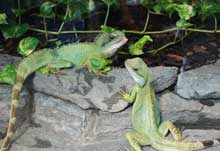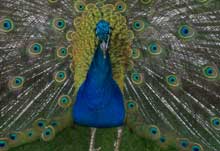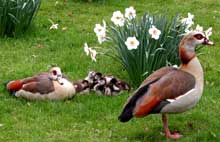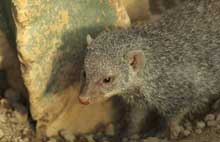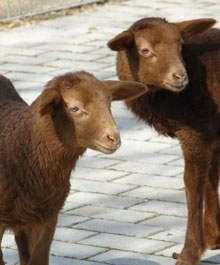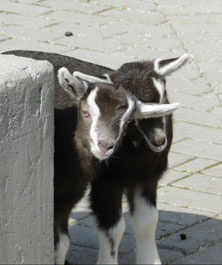Winter Lights 2026 in the Luisenpark
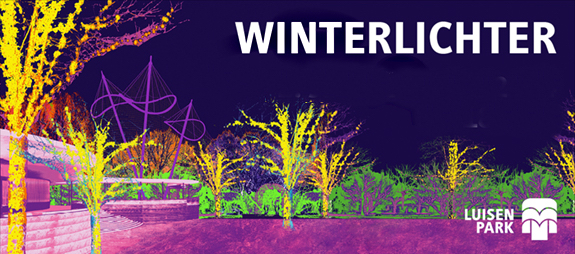
Winter evenings from January 1 to February 8.
From Thursday., 01.01.2026, 18:00 – Sunday., 08.02.2026, 18:00, Park (Outdoor)
Winter is still here, and it’s cold and dark, as always! But that’s no reason to bury our heads in the sand, the winter lights season will soon be here again! Beautiful new light displays, and a lovely long walks around the park with refreshment stalls to stop for snacks along the way.

New attractions
Butterflies, two iguanas, the caiman lady, snakes and two golden-headed lion monkeys await visitors at the South America House. The large trampoline, previously positioned at the recreation building, has a new location at the water playground. The penguin pool has now got a more attractive fence and as planned, everything will be finished here on the weekend and fresh water will arrive on Monday at the latest. The four alpacas, cuddly colleagues from the Andean highlands, which have been in the Luisenpark since the Federal Garden Show, will also be there for the reopening and visitors will be able to visit them directly in their enclosure opposite the Baumhain festival hall. The Café Gondoletta kiosk, the lakeside restaurant and the Chinese teahouse are open. In addition to visiting flamingos and pelicans, visitors can, as usual, simply take a dip in the “big green” that is now slowly turning the most beautiful shades of autumn. In short, a visit to the Luisenpark with its many new offerings is still worthwhile after the BUGA, or even more so than ever. The admission prices have been slightly adjusted, the Luisenpark Annual Pass is also valid for Herzogenriedpark as before and, and this is new, is valid for 12 months from the date of purchase.
Alliance of nature and modern architecture
For all that it offers, the New Park Center is also an aesthetic delight: bold and modern in design, the new center with its generous spaces. At the same time, it is harmoniously embedded in the existing park landscape. Thanks to large-scale glazing, interior and exterior spaces appear to flow smoothly into one another, creating a sense of transparency and permeability. The curved architecture, based on nature’s model, with its almost floating roofs, embraces the existing park landscape without dominating it. In addition to the organic, modern design language of the whole, the buildings provide new visual experiences.
Cute offspring on the farm
Since the Federal Garden Show, the farm has also repositioned itself: with Nordic livestock breeds, including white Viking cattle, Linderöd pigs and flower chickens. By the way, just in time for the reopening, two white calves have been born – but more about this beautiful story soon!

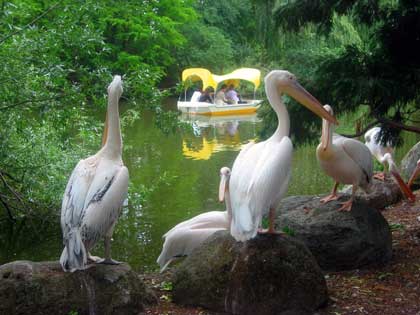
Luisenpark Mannheim
The Luisenpark is one of Germany’s most beautiful parks – and it was the first thing that came to mind in a recent survey when 5,000 Mannheim citizens were asked what was the first thing that came to mind when they thought of Mannheim – before the castle, the university, the SAP Arena, or the National Theater.
The Luisenpark extends over an area of 42 hectares – more than 100 acres – and is open daily all year round from 9 a.m. until dusk.

A short history of the Luisenpark
The Luisenpark Mannheim was first planned and laid out from 1892 – 1903. It is named after the Grand Duchess Luise von Baden, daughter of Kaiser Wilhelm I.
A new greenhouse – the Pflanzenschauhaus – was built in 1958 to replace the original Palmenhalle plant building which was destroyed during WWII.
1975 – Germany’s annual National Garden Show (Bundesgartenschau or BUGA in German) took place in the Luisenpark – the perfect opportunity for a complete renewal of the park. The new park was planned by the renowned landscape architect firm of Wagenfeld, Leipacher und Boyer.
1996 – The tropical Butterfly Paradise building – the first in southwestern Germany – was opened, the Pflanzenschauhaus building was extended in order to house a central American cactus collection and a second exhibition hall was added.
2001 – The Chinese garden with its Chinese Teahouse was opened.
2004 – An artificial rock wall was built in the foyer of the Pflanzenschauhaus, providing a natural background for the neighboring cayman and dwarf otter compounds.
From 2007 – 2009 the Pflanzenschauhaus was again extended: a new cold house for tree ferns was built next to the large tropical greenhouse. And a garden for medical plants was opened.
2008 – Building work began on a new main entrance with a souvenir shop.
Today, approximately 270 people work at the Luisenpark and its “little brother,” the Herzogenriedpark in Mannheim-Neckarstadt.
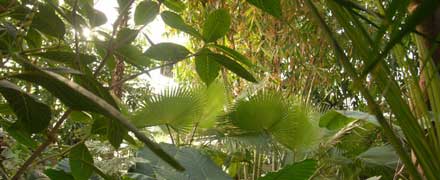
The Pflanzenschauhaus – Mannheim’s Jungle
Tropical and subtropical plants and animals, the magic of the jungle, rare animals from Africa, Asia and South America all make the Pflanzenschauhaus one of the Luisenpark’s biggest attractions.
2,700 square meters – more than 3,200 square yards of exotic worlds: more than 350 kinds of plant, 50 kinds of reptile, 350 different kinds of fish live here. The cactus house is an additional 400 square meters, the tropical butterfly house another 250 square meters.
Among the many animals in the park are more than 100 storks, flamingos, Humboldt penguins, zebra mongooses and cotton top tamarins.
Visitors can watch the penguins being fed every day at 1 p.m. except Wednesdays when feeding is at 2 p.m.
|
|
|
|
|
|
|
|
|
New Animals born on the Luisenpark Farm in spring 2011 include twin Coburg Fox Sheep (the name comes from the unusal red color of the wool); twin Thuringian Goats; and 21 baby Swabian-Hall Swine.
|
|
|
The Chinese Garden – a little piece of China in the center of Mannheim
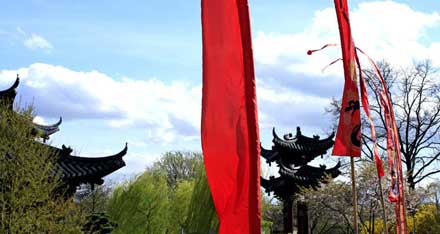
The Chinese garden is laid out according to traditional Chinese Feng Shui methods, paying particular attention to the harmony of the seven major things: earth, heaven, stones, water, buildings, paths and plants should all interact harmoniously and naturally. The paeonies which bloom in the Chinese garden in May, a traditional Chinese plant, cultivated in China for over 2,000 years, should not be missed.
Drink tea and forget the noise of the madding crowd – The traditional tea ceremony, which takes about an hour, is performed by Mrs Shuli Meng and costs €12 per person – booking required, telephone 0621 – 4107235.
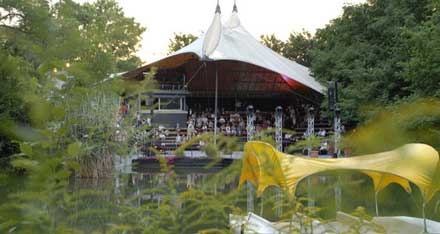
The Seebuhne is a stage that floats above the water with space for 1,000 guests.
Events at the Luisenpark
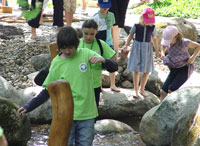
Hand and Barefoot Adventure Path
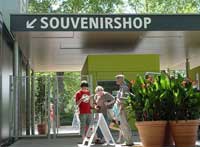
Storks nest

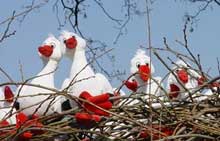
Anton the stork is the park mascot. He can be bought at the souvenir shop.
Luisenpark Mannheim
Gartenschauweg 12 · 68165 Mannheim
Visitors’ address:
Theodor-Heuss-Anlage 2 · 68165 Mannheim · Tel.: 0621 – 41005-0
Email: information@stadtpark-mannheim.de
Internet: www.luisenpark.de
Ticket Prices
Day ticket March – October
Adults: €12,50
Concessionary tickets: €9,00
Children 6-15 years: €5,50
Family tickets
For instance 1 adult, 2 children: €21,00
2 adults, 2 children: €33,50
Set of 10 entry tickets that can be used by different people throughout the year
Adults: €54,00
Concessionary tickets: €36,00
Annual season ticket
(includes entry to the Herzogenriedpark)
Adults: €59
Concessionary tickets: €44,50
Children 6-15 years : €23
